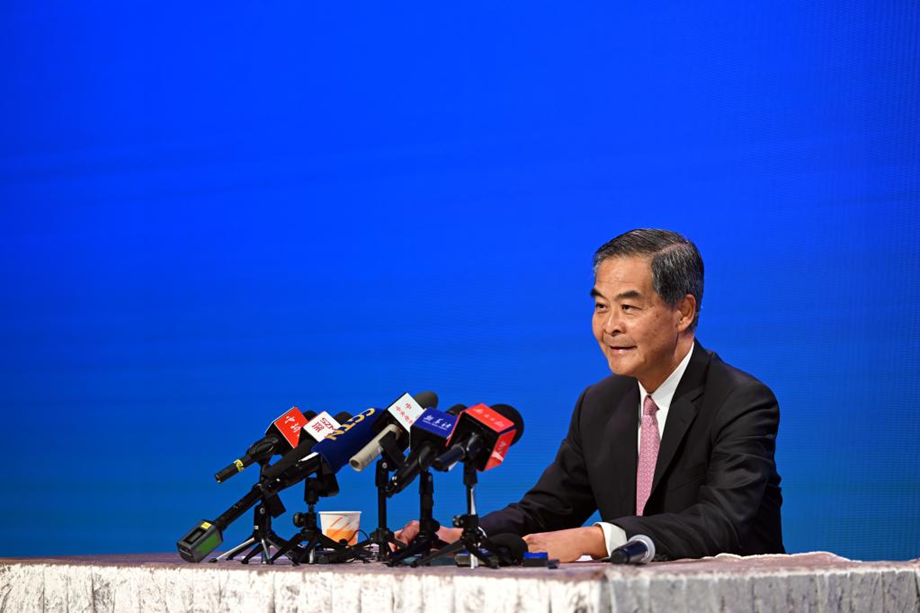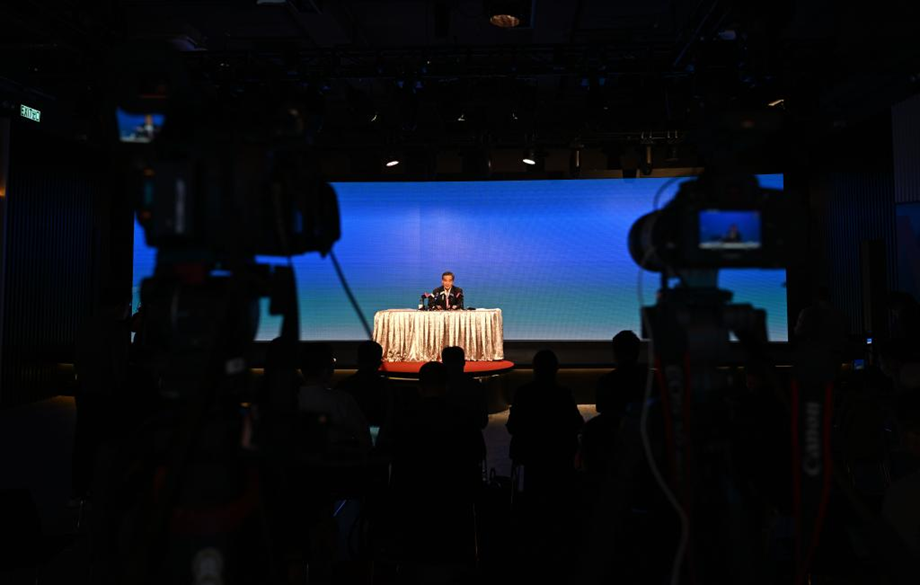Former HKSAR chief executive hails "one country, two systems" as viable, vibrant
 Leung Chun-ying, former chief executive of the Hong Kong Special Administrative Region (HKSAR), also vice chairman of the National Committee of the Chinese People's Political Consultative Conference, speaks to the press in south China's Hong Kong, June 6, 2022.
Leung Chun-ying, former chief executive of the Hong Kong Special Administrative Region (HKSAR), also vice chairman of the National Committee of the Chinese People's Political Consultative Conference, speaks to the press in south China's Hong Kong, June 6, 2022.
Leung has hailed the practice of "one country, two systems" in Hong Kong over the past 25 years as sound, viable and vibrant.(Xinhua/Jin Liangkuai)
Former chief executive of the Hong Kong Special Administrative Region (HKSAR) Leung Chun-ying has hailed the practice of "one country, two systems" in Hong Kong over the past 25 years as sound, viable and vibrant.
Leung, who is also vice chairman of the National Committee of the Chinese People's Political Consultative Conference, made the remarks in an interview with Xinhua.
Those who administer Hong Kong, including the chief executive, principal officials of the HKSAR government and members of the Legislative Council (LegCo), are elected or appointed from among local Hong Kong residents under the "one country, two systems" principle which allows the people of Hong Kong to administer Hong Kong with a high degree of autonomy.
"Such great authorization reflects the central authorities' high level of trust," Leung said, adding that it is all the more necessary to implement the principle of "patriots administering Hong Kong."
"Only by ensuring that patriots administer Hong Kong, can we meet the practical needs of Hong Kong people administering Hong Kong with a high degree of autonomy," he said.
Hong Kong is part of China and its democracy is essentially different from that of a sovereign state, Leung emphasized.
"To foster democracy in Hong Kong, we must abide by the constitution of the country and the Basic Law of the HKSAR," he added.
Leung said for some time in the past, however, there were unpatriotic people who had been elected as members of the HKSAR LegCo due to loopholes in the electoral system. Some of them even went abroad to urge foreign governments to impose sanctions on Hong Kong.
The enforcement of the national security law in Hong Kong and the improvement of its electoral system have ensured the implementation of the "patriots administering Hong Kong" principle, thereby creating the conditions for getting the development of democracy in Hong Kong back on track, Leung noted.
"Hong Kong has seen smooth executive-legislature relationship and improved performance in governance and the residents now live in a more stable society," he said, adding that these positive changes have bolstered the confidence of international investors.
Back in the late 1970s, Leung, a surveyor by profession, volunteered to introduce Hong Kong's land use system and its practical experience related to land, property and planning to Shenzhen, as China initiated the reform and opening-up drive and started the development of the industrial zone in Shenzhen's Shekou.
Hong Kong played an active role in promoting the land use and housing reforms in the mainland, he said, adding that Hong Kong will continue to play a distinctive and irreplaceable role in the country's reform and opening-up drive in the new era.
Leung called on Hong Kong to be more proactive in supporting the country's all-round opening up, integrating itself into the national development, participating in national governance and promoting international people-to-people exchanges.
Leung believes that initiatives outlined in the country's 14th Five-Year Plan (2021-2025) and the development of the Guangdong-Hong Kong-Macao Greater Bay Area have brought enormous opportunities to Hong Kong.
Hong Kong and the mainland can deepen their cooperation in sectors including financial services, professional services, and scientific and technological innovation, in addition to traditional sectors such as manufacturing and trade, he said.
"For people in Hong Kong, particularly the younger generation, better development of the country means greater opportunities for their own development," he said, encouraging Hong Kong youths to turn to the mainland for development opportunities. ■
 Leung Chun-ying, former chief executive of the Hong Kong Special Administrative Region (HKSAR), also vice chairman of the National Committee of the Chinese People's Political Consultative Conference, speaks to the press in south China's Hong Kong, June 6, 2022.
Leung Chun-ying, former chief executive of the Hong Kong Special Administrative Region (HKSAR), also vice chairman of the National Committee of the Chinese People's Political Consultative Conference, speaks to the press in south China's Hong Kong, June 6, 2022.
Leung has hailed the practice of "one country, two systems" in Hong Kong over the past 25 years as sound, viable and vibrant.(Xinhua/Jin Liangkuai)
 Leung Chun-ying, former chief executive of the Hong Kong Special Administrative Region (HKSAR), also vice chairman of the National Committee of the Chinese People's Political Consultative Conference, speaks to the press in south China's Hong Kong, June 6, 2022.
Leung Chun-ying, former chief executive of the Hong Kong Special Administrative Region (HKSAR), also vice chairman of the National Committee of the Chinese People's Political Consultative Conference, speaks to the press in south China's Hong Kong, June 6, 2022.
Leung has hailed the practice of "one country, two systems" in Hong Kong over the past 25 years as sound, viable and vibrant.(Xinhua/Jin Liangkuai)